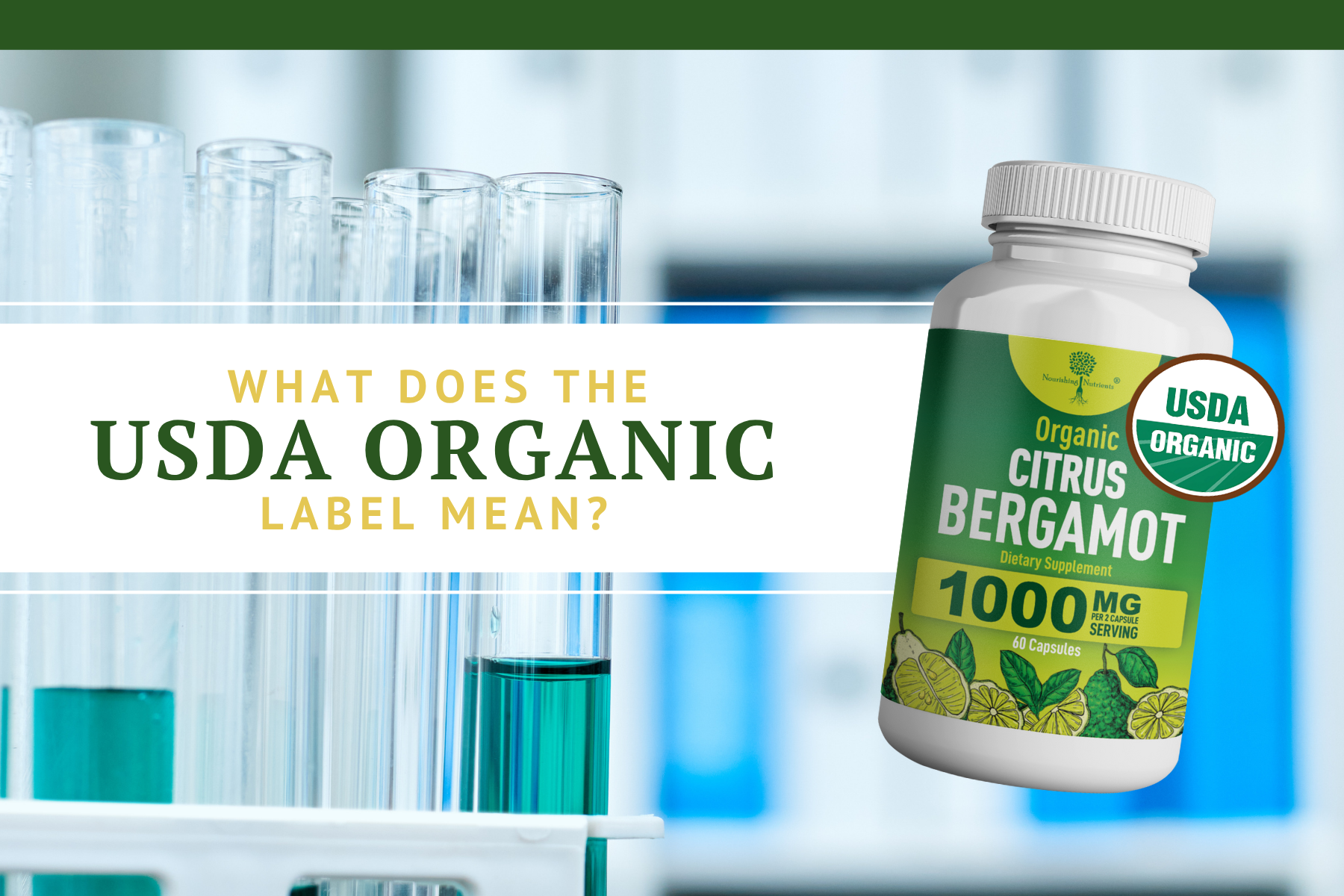What the USDA Organic Label Really Means
When you see the USDA Organic seal, it means the product meets strict rules under the U.S. Department of Agriculture's National Organic Program (NOP). These standards regulate how ingredients are grown, processed, and labeled.
In short:
- No synthetic pesticides, fertilizers, or GMOs
- No artificial colors, flavors, or preservatives
- Sustainable farming and verified soil health practices
- Annual third-party inspections for compliance
For supplements, at least 95% of ingredients must be certified organic to display the USDA seal.
The Distinction of Organic Quality
Not all "organic" labels mean the same thing. The USDA recognizes several tiers of organic certification, each reflecting a different level of purity and oversight:
| Label Term | Organic Content | What It Means |
|---|---|---|
| 100% Organic | 100% certified organic ingredients | No non-organic substances allowed (excluding salt and water). |
| Organic | 95% or more certified organic ingredients | Remaining 5% must be on the approved NOP list. |
| Made with Organic Ingredients | At least 70% certified organic ingredients | May not use the USDA seal; specific organic ingredients can be listed. |
| Non-Certified Organic | May use organic ingredients but not verified | Often used by brands sourcing organic-quality inputs not eligible for USDA verification. |
At Nourishing Nutrients, we use certified organic ingredients whenever possible and maintain organic-quality standards across all products, even when full certification isn't available.
Why Some Ingredients Can't Be Certified Organic
Some natural ingredients fall outside USDA's agricultural certification system:
- Marine ingredients, such as fish eggs (hoki roe), can't be certified because they come from the ocean, not from a controlled organic farm.
- Mineral or shell-based ingredients, like pearl powder and pearl powder capsules, are naturally occurring and not considered agricultural crops.
- Wild-harvested botanicals may meet organic principles but can't be certified without managed soil or growing environments.
That's why organic quality matters as much as certification. Every non-certifiable ingredient we use is still lab-tested for purity, heavy metal screened, and processed under GMP (Good Manufacturing Practices) to ensure safety and transparency.
Nourishing Nutrients' USDA-Certified Organic Products
1. USDA Organic Citrus Bergamot
Grown in Calabria, Italy, and certified USDA Organic, this citrus extract naturally supports healthy cholesterol balance and metabolic wellness—already within the normal range.* Each batch is third-party tested for purity and potency.
2. USDA Organic Perilla Seed with Rosmarinic Acid
Our Perilla Seed Extract is rich in plant-based omega-3s and antioxidants. It's organically grown and processed without solvents, helping to support immune and antioxidant balance naturally.*
3. USDA Organic Mushroom Powder (Superfood 10)
Made from fruiting-body-only mushrooms—including lion's mane, reishi, and cordyceps—our blend meets full USDA organic standards and helps maintain immune resilience, mental clarity, and natural energy.*
4. USDA Organic Black Cumin Seed Oil
Cold-pressed from organically grown Nigella sativa, this oil provides natural thymoquinone and phytonutrients that support immune and metabolic balance—no solvents, additives, or fillers.*
5. USDA Organic Gelatinized Black Maca
Sustainably grown in the Peruvian Andes, our gelatinized black maca is USDA Certified Organic and processed for enhanced absorption. It’s traditionally used to support vitality, endurance, and hormone balance—all without synthetic additives or fillers.*
Organic Quality in Non-Certifiable Products
Pearl Powder
Though not eligible for USDA certification, our pearl powder is produced through an enzymatic hydrolysis process for optimal absorption and tested for purity, lead, mercury, and arsenic. It's a clean, bioavailable source of calcium and amino acids that supports collagen synthesis and skin nourishment.*
Fish Eggs (Hoki Roe Capsules)
Harvested from wild New Zealand hoki, this marine source is IFOS 5-star certified for freshness, oxidation control, and heavy metal safety—meeting or exceeding global supplement testing standards.*
How to Identify Real USDA Organic Certification
Before buying, check:
- The USDA Organic seal on the label
- The certifying agency's name (e.g., CCOF, QAI, Oregon Tilth)
- The statement "Certified Organic by [Agency]"
- Ingredient list showing 95%+ certified organic content
If a label says "Made with Organic Ingredients," it meets the 70% standard but cannot use the USDA seal.
Why USDA Organic Still Matters
Choosing certified organic supplements supports:
- Cleaner ingredients—free from GMOs and most synthetic residues
- Environmental stewardship through sustainable farming
- Traceability and transparency from soil to bottle
- Ethical production practices protecting ecosystems and workers
Whether an ingredient is certified organic or held to organic-quality standards, Nourishing Nutrients ensures every product aligns with these same principles of integrity and safety.
Key Takeaways
- The USDA Organic seal verifies a product meets strict agricultural and processing standards.
- Organic quality means applying those same high standards even to ingredients that can't be certified (like marine or mineral-based nutrients).
- Nourishing Nutrients offers both USDA-certified organic and lab-verified, organic-quality supplements that prioritize purity, sustainability, and transparency.
Choosing certified or organic-quality products helps you nourish your body naturally—without compromising on integrity.
Disclaimer
These statements have not been evaluated by the Food and Drug Administration. This product is not intended to diagnose, treat, cure, or prevent any disease. Always consult your healthcare provider before starting any new supplement.
Explore our USDA Certified Organic and organic-quality collections at Nourishing Nutrients—crafted for people who care about clean ingredients, sustainable sourcing, and science-backed integrity.



